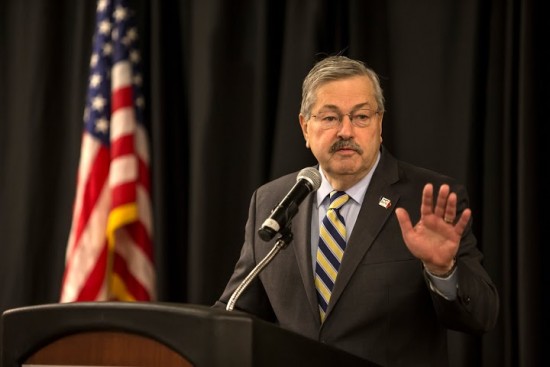By Jacob Prall
If you search for the term “incumbent” in a dictionary, you might well find a picture of Iowa Gov. Terry Branstad grinning wide. His entrenched political power is felt throughout the state. For the University of Iowa, it is in the form of cronyism: enter President Bruce Harreld and the state Board of Regents.
But hey, Terry knows times are tough. It’s time to buckle down, penny-pinch, chase the almighty dollar, right?
Now, Terry had an idea. Iowa should give billions of public dollars to for-profit private companies to handle Medicaid claims. This privatization, Terry assured us, would save the taxpayers lots of greenbacks. His administration never produced any figures or data to support the claims.
In fact, a lot of people thought this to be a very bad idea. Other states were losing on the bid of privatized Medicaid. The public decided against it in the Des Moines Register. State legislators and colleagues urged him to resist the allure of big money. I’m sad to say that they failed. Terry triumphantly started the process of privatization in September 2015. And we are now starting to reap the rewards.
Around 560,000 Iowans are covered by Medicaid. That’s a lot of people, so it’s not unreasonable to assume quite a few claims needed to be covered. In the three months since the switch to private companies, chaos has reigned across the state for health-care providers.
Terry’s little experiment isn’t paying off, and in big ways. Many health-care providers aren’t being paid; they’ve gone weeks or even months without paychecks. The state workers’ union won’t stop bothering poor Terry over this little issue. Workers from all sides of the health-care spectrum are affected: assistants to the elderly or disabled, speech and hearing therapists, pediatric-care providers, they’re all going unpaid after doing some of the most important work for our society. They deserve the best and are getting the worst.
The Register reported on a statement by Sen. Liz Mathis, D-Cedar Rapids, who, along with other state legislators, has experienced a tidal wave of people seeking their earned income.
“Legislators continue to receive an unprecedented number of emails, phone calls, and face-to-face questions. It is not getting any better; in fact, it is getting worse,” she said.
The state was overwhelmingly underprepared for the transition, which many had pointed out to Branstad before his decision to implement the program. Not paying workers isn’t a sustainable way to save money; it’s pungently despicable.
The Register also reported on several health centers covering various issues that have resorted to taking out loans to pay their workers. As the money dwindles, I can’t help but wonder if Branstad will be picking up the interest check tabs. He wants to save us money, after all.
I wrote on the subject of privatizing government a few weeks back. What is happening now is what I warned against then: shifting managerial responsibility from the people to stockholders has inherent risks. Health care is a necessity and shouldn’t be used to turn a profit. We had a perfectly capable system, but Terry’s ill-fated system has begun to dismantle the health-care prowess of the entire state.



